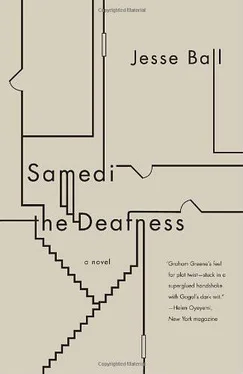Jesse Ball - Samedi the Deafness
Здесь есть возможность читать онлайн «Jesse Ball - Samedi the Deafness» весь текст электронной книги совершенно бесплатно (целиком полную версию без сокращений). В некоторых случаях можно слушать аудио, скачать через торрент в формате fb2 и присутствует краткое содержание. Год выпуска: 2007, Издательство: Vintage, Жанр: Современная проза, на английском языке. Описание произведения, (предисловие) а так же отзывы посетителей доступны на портале библиотеки ЛибКат.
- Название:Samedi the Deafness
- Автор:
- Издательство:Vintage
- Жанр:
- Год:2007
- ISBN:нет данных
- Рейтинг книги:5 / 5. Голосов: 1
-
Избранное:Добавить в избранное
- Отзывы:
-
Ваша оценка:
- 100
- 1
- 2
- 3
- 4
- 5
Samedi the Deafness: краткое содержание, описание и аннотация
Предлагаем к чтению аннотацию, описание, краткое содержание или предисловие (зависит от того, что написал сам автор книги «Samedi the Deafness»). Если вы не нашли необходимую информацию о книге — напишите в комментариях, мы постараемся отыскать её.
Samedi the Deafness — читать онлайн бесплатно полную книгу (весь текст) целиком
Ниже представлен текст книги, разбитый по страницам. Система сохранения места последней прочитанной страницы, позволяет с удобством читать онлайн бесплатно книгу «Samedi the Deafness», без необходимости каждый раз заново искать на чём Вы остановились. Поставьте закладку, и сможете в любой момент перейти на страницу, на которой закончили чтение.
Интервал:
Закладка:
— What a great fellow you are, said James. People can only talk like that in recounting. No one talks like that anymore.
Once they did, said Ansilon. And not so long ago. If you want the truth, I gave him the figurine and he gave me this.
Ansilon produced a wad of banknotes. James took them.
— That'll do nicely, he said. When shall we leave?

— So you understand, said Carlyle, the nineteenth century was overrun with liars. So many small corners of the world had been left unexplored that fact held no hegemony. Margret Selm, psychological theorist and unacknowledged artistic genius, came up with a strategy for rehabilitating chronic liars. It was based on her country-house experiments, where she would isolate problematic communities or ideas, and see what happened when they operated independent of the world itself.
— How did she fund these experiments? asked James.
They were in the kjoll room. The walls, ceiling, even the doors were painted over with a crowd of women, all in the process of trying on different dresses. So many there were that the scene itself could not be made out. The detail of the dresses was so finely painted that one could approach to within inches and see perhaps a fly that had landed a moment on a woman's shoulder as she bent to straighten a stocking.
— She was born to a wealthy Swiss family, continued Carlyle. At that time, the official position of the Swiss was that there were no liars in Switzerland. Accepting this as gospel, despite the rigor of her genius, she left at first for parts unknown in her quest to study a population of chronic liars. She next appears on a steamer bound up the Mississippi. She is known to have learned English in a miraculous four days with the use of a half-burned Bible and a volume of Christopher Smart. She made her way east and north, and established in the Adirondacks a large and well-stocked manse. To her then she drew many wits and intellects, and they fell all to helping her in her good works. She wrote a book, the manual you have on the table upstairs, that graces in fact every room of this house. As you know, it holds the rules, all the rules by which life here is conducted. She decided that the difficulty with chronic lying is that at some point it begins to efface identity. The reason for this is that the liar's lies are constantly being approached and rebutted by truth. Then they are destroyed and the liar is left with nothing, not even with the original truth, because the original truth has been forgotten, and in any case cannot be accepted once it is the destroyer of his/her own arrived-at fact.
Carlyle leaned against the window casement and lit a cigarette. He nodded slightly to himself, as though fixing the details of his own continuing narrative.
— Because, said he, the truth is, liars are very rooted in identity. Their passion for identity might even be said to be greater than that of honest folk. An honest man is content with his identity, content with the facts of the world. A liar goes past the world's facts and the world's state and says, I am not as has been seen; what I have done is not what I have been seen to have done. They replace what has been seen with what they have supposed, with what they have hoped for, with divergent accounts of greater or lesser fabulousness. This passion for the assertion of identity is like a vessel at sea that sails with great speed and ability in the open ocean. Fetch it up against rocks, however, and it is torn to bits, it, the crew, the captain. So, the idea was to take a population of chronic liars, put them in an isolated environment, Selm's country house, give them a number of complex and arbitrary rules, no one of which prohibits lying, and allow their lies to go unfettered. Out of unfettered lying, in a structure of obeyed regimens and rules, Selm believed new identities would be constructed that could gain a sort of internal integrity that eventually would pass into truth. After all, the facts of yesterday do not always hold more bearing than yesterday's fictions. So she said.
— Did it work? asked James. Why haven't I heard of it?
— Well, said Carlyle, the manse burned down in a lightning storm. A few studies had been done of the place. They were optimistic but unsubstantiated. Several copies, however, existed of her manual, and also the architectural plan of her ideal country house. Dr. Stark found these, read them, and was fascinated. He thought that the arbitrary rules she had set down were a work of genius, and would bring pleasure to any life. Also, as a psychologist himself, he was interested in the application of the process. So, he had this place built according to her blueprint. He printed many copies of the manual. His mandarin assurance and prowess guaranteed the project some degree of notoriety. Therefore, patients came, not generally of their own free will, of course, but most have been pleased with their stay. In fact, often, they prefer life within our walls.
— The results, though, said James, have shown the experiment to be a success?
— Experiments, said Carlyle, are not ever successful. Or they are always successful. Have it either way. An experiment simply procures information that was hitherto unclear.
— Fine, said James. But does it help cure chronic lying?
— Cure it, no, said Carlyle. But it makes the lives of liars happy, and allows them to live either in the world, or in this closed space as others live in wealth. Stark has theories about the imagination, its prowess, its possibility.
— And you've lived here many years, you and the others who aren't patients, everyone in your family? Here with the rules, the nurses, the orderlies? Is there any countereffect from living in this house? Do you grow used to constant lying?
— Yes, said Carlyle. We do, we do. As I said, lies are often simply stated desires. How can such a thing be untrue? It's untrue only in its reception, not in the manner of its appearance.
He opened the window and threw his cigarette out onto the long green-gray lawn. The sound of laughter and also footsteps on the porch beneath joined them in the room. Carlyle smiled. His eyes met James's.
— Lying is like breathing, he said. When you notice that you're doing it, there's a sudden fear: if I stop, will I die? When I was a child, I had a little wooden boat with a cloth sail. I put a metal figurine of Charlemagne in the cabin, and pushed it out on a lake near the house where I first lived. I held on to it with a long string. Do you know what happened then?
James said that he did not.
— What happened then? he asked.
— A man in a skiff came. I saw him from far away, and thought something bad was about to happen. But I did nothing. Curiosity is often what makes us powerless. I watched as he came closer and closer on the lake. He wore a brown worsted suit and had unkempt hair. His eyes were different colors. He sculled up with a single-minded intensity, right up to my little boat. I stood helpless on the shore, clutching at the string. From his pocket he took a knife. He cut the string, put my boat in his skiff, and sculled away. I was horrified. I stood there, string in hand, and when someone came to fetch me, I could give no answer about what had happened. In fact, I've never spoken of it until now.
The light then in the kjoll room bore the shape of a mansard. Six leaves blew one by one through the window and landed at the feet of the two men.
Should I reach down and pick one up? thought James. If I did so, what would it mean?
A moment, then another moment.
Carlyle shut the window.
— Let's go find the others, he said. Hours of evening are ahead.

Интервал:
Закладка:
Похожие книги на «Samedi the Deafness»
Представляем Вашему вниманию похожие книги на «Samedi the Deafness» списком для выбора. Мы отобрали схожую по названию и смыслу литературу в надежде предоставить читателям больше вариантов отыскать новые, интересные, ещё непрочитанные произведения.
Обсуждение, отзывы о книге «Samedi the Deafness» и просто собственные мнения читателей. Оставьте ваши комментарии, напишите, что Вы думаете о произведении, его смысле или главных героях. Укажите что конкретно понравилось, а что нет, и почему Вы так считаете.












